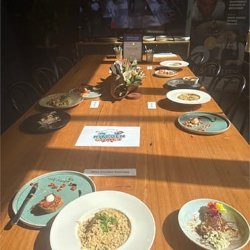Germany’s cold climate allows it to grow a wide variety of apples as well—apparently there are over two thousand types. In spring they bloom with lovely white flowers that look like cherry blossoms, and in fall the trees are heavy with their bounty of harvest-ready apples as far as the eye can see.
The Germans eat apples in all kinds of different ways. Yogurt and reibekuchen (German potato fritters) topped with apple mousse is a popular snack, and they also make apple cake, boiled apples and red cabbage, salads with apples, and more.
Pectin is the dietary fiber found in apples, and it helps keep cholesterol levels down, prevent arteriosclerosis, and support a healthy gut. Potassium helps eliminate excessive sodium intake, which can help people with high blood pressure. Apples also have an antioxidative effect, which makes them an incredibly healthy fruit. The Germans are said to consume around 25 kilograms of apples per person every year.

Fuji apples
Not every shop sells Fuji apples, but this sweet, juicy Japanese apple variety is my favorite.
Elster apples
This sweet-tart variety is the most popular apple in Germany. They’re delicious on their own, but people stuff geese or other roasted birds with Elster apples and marjoram during Christmastime to make the meat come out juicier.
Jonagold apples
This is a large apple variety originally from the US. It’s known for being tender and quite sweet.
Braeburn apples
This variety comes from New Zealand. The flesh is firm and they’re not too tart, so they’re definitely a delicious choice worth mentioning.
Gala apples
These small, sweet apples are popular as a snack for kids.
Rubinette apples
This is another small apple that comes from Switzerland. The flesh is firm and juicy, and they have a wonderful aroma.

Fresh-pressed apple juice from local farmers is natural, delicious, and incredibly safe. Both kids and adults love a drink called apfelschorle, which is made by mixing apple juice with carbonated water.

These apple chips are marked nicht geschwefelt (unsulphured), which means they can safely be given to small children as dried fruit.

Germany is extremely strict about the use of agricultural chemicals, so you can see why the health-conscious Germans feel so safe eating apples grown domestically.
I like the winter months when you can bite into a wax-free, all-natural apple.




















































